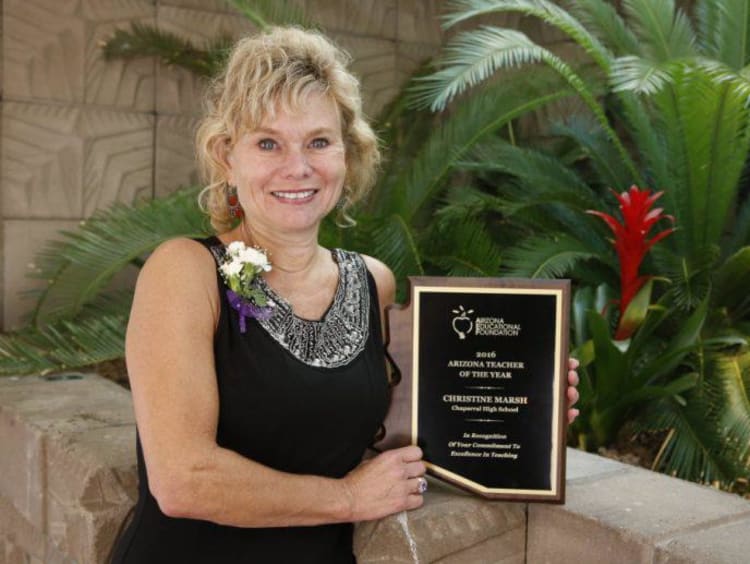Alumni Spotlight: Teacher of the Year Christine Marsh

Teachers who have a strong passion for what they do inspire their students. Teaching is not for everyone. However, when it is in the hands of someone who has an undying passion to not only educate, but also to impact the lives of students, it is a very rewarding career. Read along as Grand Canyon University alumna and Arizona Educational Foundation’s 2016 Teacher of the Year, Christine Marsh, shares her experience as a teacher and what she has learned about the importance of passion.
In your opinion, what makes a successful teacher?
A: A successful teacher is one who values each of their students and is able to convey to them that they are valued. Students are far more perceptive than most adults believe they are. In fact, my experience has shown me that students (teenagers, specifically) are more perceptive than most adults are. Thus, they can literally feel when they are not valued, so teachers need to be certain that they reveal that they value them.
Where did your passion for teaching come from?
When I was in college, I honestly wanted to change the world, and I was naïve enough to think that I could. It was not until I was about 20 that I realized that I probably was not capable of changing the entire world. When I look back on that, I almost have to chuckle at myself, because 20 years old is very old to still be so naïve. However, that naivety served me well, because it caused me to think big, and when the epiphany arrived that I would not change the world, I decided that I was going to make as big of an impact as possible.
I decided that teaching would be a way to do that, because I could influence students who could then influence others. I imagined a smooth pond and throwing a rock in the middle of it, and I envisioned the circle of waves that it would create. I wanted to metaphorically create those waves, and I thought (and still think) that teaching does that.
After I made the decision to teach, I visited my favorite high school teacher, Mark Miller, who inspired me to narrow it down even further by becoming an English teacher. I did not really understand why he made such an impact on me when I was in his class, but I later spent time in his classes as part of my certification process and realized what it was. Mark Miller made students feel secure enough to stretch and challenge themselves beyond what they thought were their own capabilities. I knew that I wanted to do that, too.
What has been your best experience as a teacher so far?
There are too many wonderful experiences to pinpoint one that is “best.” On any given day, I see my ex-students’ activities on Facebook, and those always make me incredibly proud. In the past two weeks, I’ve had an ex-student win in a statewide election, an ex-student get an article about the election published in The Huffington Post, an ex-student win Miss Scottsdale and countless ex-students advocate for social justice issues around the country – and even the world. Watching as my students become powerful advocates on behalf of others is the best experience, and it happens every week. I don’t know how much, if any, impact I’ve had on their advocacy, but I love watching it unfold.
On a more personal note, one of the very best experiences was teaching my own son, who is now 23. He was in my Advanced Placement (AP) English class his senior year, and seeing the student-side of him was such a blessing, and I think his ability to see the teacher-side of me was a blessing to him, too. It was one of the few times I have argued with my principal, and I only did so because Porter, my son, asked me to. I said to him, “The administration doesn’t want me to teach my own son; are you absolutely sure this is a battle you want me to fight?” He said, “Yes. I want the best teacher on campus, and that’s you.” So I went back to the principal and pleaded my case (those aren’t Porter’s exact words – my memory is not that good – but they have to be incredibly close to exact). When I was nominated for Teacher of the Year in April 2015, he immediately said, “You’re going to win,” and even though I didn’t believe him, his comment did make me stop and think, because he would know – he had me as a teacher.
What is the best advice you have for a first time teacher?
First, make students feel special. However, don’t do it in a fake, artificial way. You have to mean it. You have to truly feel that every student is special, which means that you might sometimes have to really focus on and celebrate the small glimmers of light in a student who otherwise makes you crazy. It’s natural that you won’t like every student, just as you don’t like every adult in your life. However, you have to find a way to like them all – every single one of them. Every. Single. One.
Second, don’t ever lie to kids. Their lie detectors are more finely tuned than any adult I have ever met. If you lie to them, they will never forget it. That means that you have to be willing to say, “I don’t know” and “I’m sorry” and “You were right, and I was wrong” and “I messed up on that assignment/quiz/test.”
Third and finally, a more practical piece of advice is to give into fear and anxiety. The first year(s) of teaching are scary and create a great deal of anxiety. Just roll with it. And remember that you only have to stay a half step ahead of the students. During my first few years of teaching, I was never more than a day or two ahead of the students, and sometimes I was only a few minutes ahead of them.
Christine Marsh’s advice and experience shows that teaching is something that requires passion and dedication. Teachers really do make a difference in the world, as they not only educate their students, but also inspire them to be best that they can be. The College of Education at Grand Canyon University prepares educators of the future to take on the classroom. For more information about GCU’s education degrees, visit our website or use the Request More Information button at the top of this page.
The views and opinions expressed in this article are those of the author’s and do not necessarily reflect the official policy or position of Grand Canyon University. Any sources cited were accurate as of the publish date.


